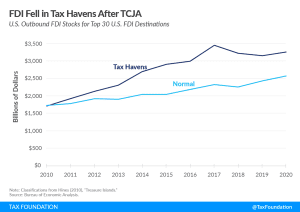The economic crisis caused by the coronavirus pandemic poses a triple challenge for tax policy in the United States. Lawmakers are tasked with crafting a policy response that will accelerate the economic recovery, reduce the mounting deficit, and protect the most vulnerable.
To assist lawmakers in navigating the challenge, and to help the American public understand the tax changes being proposed, the Tax Foundation’s Center for Federal Tax Policy modeled how 70 potential changes to the tax code would affect the U.S. economy, distribution of the tax burden, and federal revenue.
In tax policy there is an ever-present trade-off among how much revenue a tax will raise, who bears the burden of a tax, and what impact a tax will have on economic growth. Armed with the information in our new book, Options for Reforming America’s Tax Code 2.0, policymakers can debate the relative merits and trade-offs of each option to improve the tax code in a post-pandemic world.

Three Questions on Pillar One
While the global minimum tax gets much attention in the media, there is another significant piece to the deal.
6 min read
Lithuanian Model Could Help French Workers’ Upward Mobility
Reshaping some of these policies to generate a smoother variation of marginal tax rates over different income levels would likely raise labor supply and encourage the upward mobility of workers and especially that of average-income workers.
5 min read
Biden and OECD Tax Proposals Would Hurt FDI
Academic research indicates foreign direct investment (FDI) is highly responsive to the corporate effective tax rate (ETRs); that is, the tax rate after accounting for all deduction and credits available to corporations.
3 min read
Pennsylvania Cuts Corporate Net Income Tax Rate
Policymakers from both parties in Harrisburg have proposed reducing Pennsylvania’s 9.99 percent corporate net income tax (CNIT) rate but could not agree on an approach—until now. With the enactment of HB 1342 lawmakers finally succeeded in cutting what had been the second highest state corporate tax rate in the nation.
7 min read
Idaho’s Tax Hiking Ballot Measure Is Riddled With Mistakes
Idaho Ballot initiative would impose an incredibly high top marginal rate that would fall on many small businesses, not just high-income earners.
7 min read
Navigating the Complex Income Tax System in Italy
High marginal tax rates can act as barriers to upward mobility, discouraging people from advancing in their careers.
5 min read
Lawmakers Revive Prescription Drug Pricing Policies and 1,900% Excise Tax
While the bulk of the proposed tax increases and spending programs remain under debate, Democratic lawmakers have reportedly agreed on prescription drug pricing provisions as a starting point for a revived Build Back Better package.
3 min read
Tax Files Under New Council of EU Presidency: Czechia
As the Czech EU presidency considers a plan to manage various tax-related files, it would be wise to consider principled tax policy that broadens the tax base and reduces the tax wedge on strategic investment.
4 min read
Trends in FDI Before and After the Tax Cuts and Jobs Act
Overall, the data shows outbound FDI shifted from low-tax to other jurisdictions, while inbound FDI remained largely unchanged.
3 min read
Oklahoma Becomes First State in Nation to Make Full Expensing Permanent
Gov. Stitt signed into law a pro-growth bill that will set the state apart from its peers. Other states should look to follow Oklahoma’s example and make full expensing permanent to maintain their competitiveness in an increasingly mobile economy.
3 min read